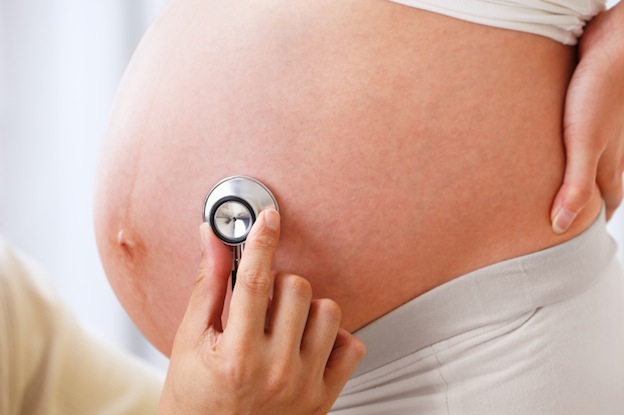SingaporeMotherhood | Parenting
March 2014
Getting Pregnant after 35

Carrying a child when you’re over the age of 35 brings with it some additional risks to both yourself and your baby. But it’s not at all an impossible task.
It’s a fact of life that a woman’s fertility declines with age, especially after she hits 35.
When trying to conceive naturally, the percentage of women that would have a baby within one year is 75 per cent at age 30, 65 per cent at age 35 and 45 per cent at age 40.
[banner][/banner]
And it seems that even using assisted reproductive technologies cannot fully compensate for the natural decline in fertility.
If a woman does fall pregnant after 35, there are additional risks that come with pregnancy.
“For women who are pregnant over the age of 35, there is a higher risk of miscarriages, ectopic pregnancy, genetic disorders and a higher risk of developing medical conditions like diabetes and high blood pressure,” says Dr Seng Shay Way, Specialist in Obstetrics and Gynaecology & Consultant, Raffles Women’s Centre.
“They are also at a higher risk of developing certain complications during pregnancy, such as gestational diabetes, pre-eclampsia, placental abruption (in which the placenta prematurely separates from the uterine wall) and placenta previa (in which the placenta lies low in the uterus, partly or completely covering the cervix).”
Falling Fertility
And, although there are just five years between them, getting pregnant between the ages of 35 and 40 also comes with a different set of possible issues.
The three main differences are:
(i) a further drop in fertility and an increase in the miscarriage risk
(ii) a significant increase in the risk for foetal abnormalities, especially Down Syndrome; and
(iii) a marked increase in the incidence of maternal conditions such as gestational diabetes and pre-eclampsia.
“Women around the age of 40 generally find it harder to get pregnant than those in their mid-thirties because, among other things, fertility declines with age,” explains Prof Mahesh Choolani, Obstetrician & Gynaecologist at The Choolani Clinic. “The risk of miscarriage also increases in older women, due to the higher incidence of chromosomal abnormalities.
“Pregnant women around the age of 40 also face an increased risk of having a baby born with physical, structural and chromosomal abnormalities. For example the risk of having a baby with Down Syndrome increases from one in 350 at age 35, to one in 100 at age 40.”
These added risks are not limited to pregnancy. There are also other possible expected complications at the time of delivery.
Dr Seng explains: “Research also shows that your chances of having a low-birth-weight baby (less than 2.49 kg) or a premature delivery increase with age. Some studies show that older women are more likely to need drugs like oxytocin to help during labour, and most studies show a significantly higher rate of delivery by Caesarean section.”
Get Yourself Tested
To ensure the best possible care during pregnancy and that mums-to-be are well-prepared for any risks and possibilities of problems, doctors advise additional tests done for women who are pregant over the age of 35.
“Prenatal testing is important for women over 35,” says Prof Choolani. “These can be classified as Screening tests like the First Trimester Screen and Nuchal Translucency, or Diagnostics tests, which include Amniocentesis or CVS (Chorionic Villus Sampling). Screening tests provide a risk estimate, or the likelihood, that a foetus might be affected by a chromosomal abnormality such as foetal trisomy 13 (Patau syndrome), 18 (Edward syndrome) or 21 (Down syndrome).”
The advantage of screening tests is that they pose little direct risk to the foetus or mother.
“Amniocentesis and CVS are two of the most common prenatal diagnostic tests performed during pregnancy,” adds Prof Choolani. “Both may be performed to diagnose various chromosomal and genetic conditions in the foetus. Although these tests are highly accurate, they carry an approximately one in 100 chance of miscarriage.
“Recent advancements in science have allowed us to give pregnant mothers more accurate results with non invasive prenatal testing. These are also risk-free blood tests that can detect down syndrome and a host of other chromosomal abnormalities with 99 per cent accuracy.”
Older, But More Stable
While there might not be any medical or physical benefits to being pregnant over the age of 35, older mums generally have a financial advantage over their younger counterparts.
“The pro [about an older pregnancy] is that most older women would be more settled in their careers and life and financially be in a better position than younger women to start a family,” says Dr Seng.
There are certainly some emotional advantages too. “We notice older mums seem better prepared to deal with the issues that come along with pregnancy,” shares Prof Choolani.
“Most women in their mid-30s seem emotionally stronger to deal with issues that arise during pregnancy. Being financially more stable also helps to alleviate the stresses associated with the cost of a high risk pregnancy.”
So you are over 35, and you’ve just discovered that you are pregnant. Time to panic? Not at all. Not every mum over the age of 35 has had a difficult experience with pregnancy.
Shanti was four months shy of her 40th birthday when her baby was born. “I had gestational diabetes but, thanks to very good advice from my doctor, I managed to get it under control and it didn’t affect my baby. Other than that, I didn’t have any issues that were considered out of the ordinary,” the stay-at-home-mother said.
Account manager Jo, who was 39 when she had her daughter, enjoyed a very easy pregnancy. The only ‘problem’ she had was very swollen feet two weeks before she gave birth. “I had to have a C-section because of the position that my baby was in, but I had no problems while I was pregnant. I didn’t even suffer from morning sickness. And it it took us only three months to conceive, even though we were told that it might take us up to a year.”
All content from this article, including images, cannot be reproduced without credits or written permission from SingaporeMotherhood.
Follow us on Facebook, Instagram, and Telegram for the latest article and promotion updates.






